Rambler Ranch
The Rambler Ranch is the culmination of Terry Gale's ideas, style, and tastes from a broad and diverse range of sources,
The Classic Car Club of America Museum in Hickory Corners, Michigan is a part of the Gilmore Car Museum. Today the campus contains eight barns that are filled with some 240 wonderful automobiles. Along with three miles of paved roads to exercise them, a restored diner, a wayside train station, and a re-creation of a 1930’s service station, the barns grace the beautifully landscaped 90 acres in rural southwest Michigan.
A nearby barn that had been built in the 1890s was acquired, moved to a corner of the Gilmore grounds, and rebuilt. It was named for Tom Barrett, the Arizona collector, who helped fund the project. Very soon great Classic cars like Duesenbergs, Rolls-Royce, Cadillac, Lincoln, Packard, and Wills-Sainte-Claire began motoring into the Thomas W. Barrett Barn.
Then Marvin Tamaroff, a long-time CCCA member from Michigan and a strong supporter of the Museum, offered his incredible mascot collection. It’s believed to be the largest in the world.
Now 675 rare, exciting and original hood ornaments are on display for visitors to enjoy. Over the years, a lot of very dedicated people have helped the CCCA Museum grow. Among them was Noel Thompson of New Jersey. Noel generously donated the funds to build a library. Again, contributions poured in: automobile books, magazine collections, and literature.
A few years ago it became obvious the Museum had outgrown itself. Again, friends stepped forward to help. The new octagon barn is named for Dr. Erle M. Heath who was a CARavaner extraordinaire. The barn was completed in record time and has almost doubled the floor space. Dick & Linda Kughn, who have been long-time supporters, contributed $100,000.00 toward the project.
The new gallery has been named in their honor. Former Museum president and current Museum trustee Fred Guyton was not only the architect of our new barn but was instrumental in a great deal of fundraising to make the project a success.
The CCCA Museum at Gilmore is open year-round. The main event for the Classic Car Club of America Museum is called “The Experience.” It’s held on the first weekend of June.
6865 W. Hickory Road
Hickory Corners, Michigan 49060
P: 269-671-5333
Email: info@cccamuseum.org
Admission Rates ($2 off per ticket January – March)
Admission includes access to shows and all museum buildings and exhibits. Parking is free.
Adults / Seniors: $20
Veterans (Must present ID. Sold onsite only.): $18
Youth (ages 11–17): $12
Children (10 and under): FREE
Active Military (must present ID): FREE
Adult Consecutive Two-Day Pass $36
Youth Consecutive Two-Day Pass $20
Plan: 2+hr
Daily 9 am – 5 pm
April 1 – November 30
Image via https://www.facebook.com/cccamuseum/
.
The Rambler Ranch is the culmination of Terry Gale's ideas, style, and tastes from a broad and diverse range of sources,
The Museum of Bus Transportation (MBT) has merged with the AACA Museum to have a permanent exhibit on display.
Texas Fire Museum has over 60 antique fire vehicles on display to showcase a century of fire service in this nonprofit museum.
The San Antonio Fire Museum is, as many visitors say, one of San Antonio’s hidden gems.
automotive museum guide
Sign up to get updates about automotive museums right to your mailbox. Don't miss a thing. It's FREE.
Okay, the honest truth is I did not drive all the way from my home in San Antonio to Los Angeles just to see the Petersen Automotive Museum. I actually came to see another exhibit, a temporary one, at another museum, one that has nothing to do with cars.
But, hey, why waste the trip?
The Petersen Museum, the unofficial Home Base for American automotive culture, is always a Must-See automotive museum. Located on the corner of Wilshire Boulevard and Fairfax Avenue, the Petersen anchors the western end of the Miracle Mile.
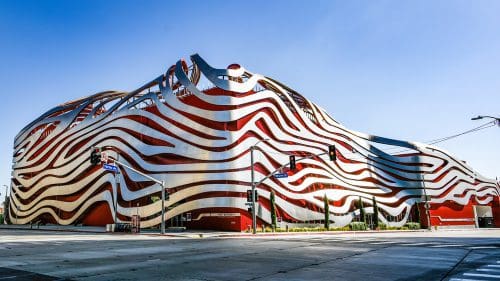
That name seems to mean something particular to Angelinos, but not to me. I’m more impressed by the striking design of the museum’s building, a repurposed department store wrapped now in a voluptuous steel skin that makes it the architectural focal point of the area, even more than the Motion Picture Academy’s weird new Death-Star-shaped theater, hiding behind their museum across the street. Once you see the Petersen — or the Death Star Theater, for that matter — you never forget it.
Like most car museums, the Petersen doesn’t have room to display its entire collection at one time. There are two ways to deal with this problem. Many museums cram in all the cars they can, and visitors have to be satisfied with standing by a bumper and looking over the body from there. Maybe the other end of the car can be glimpsed from the next crowded row.
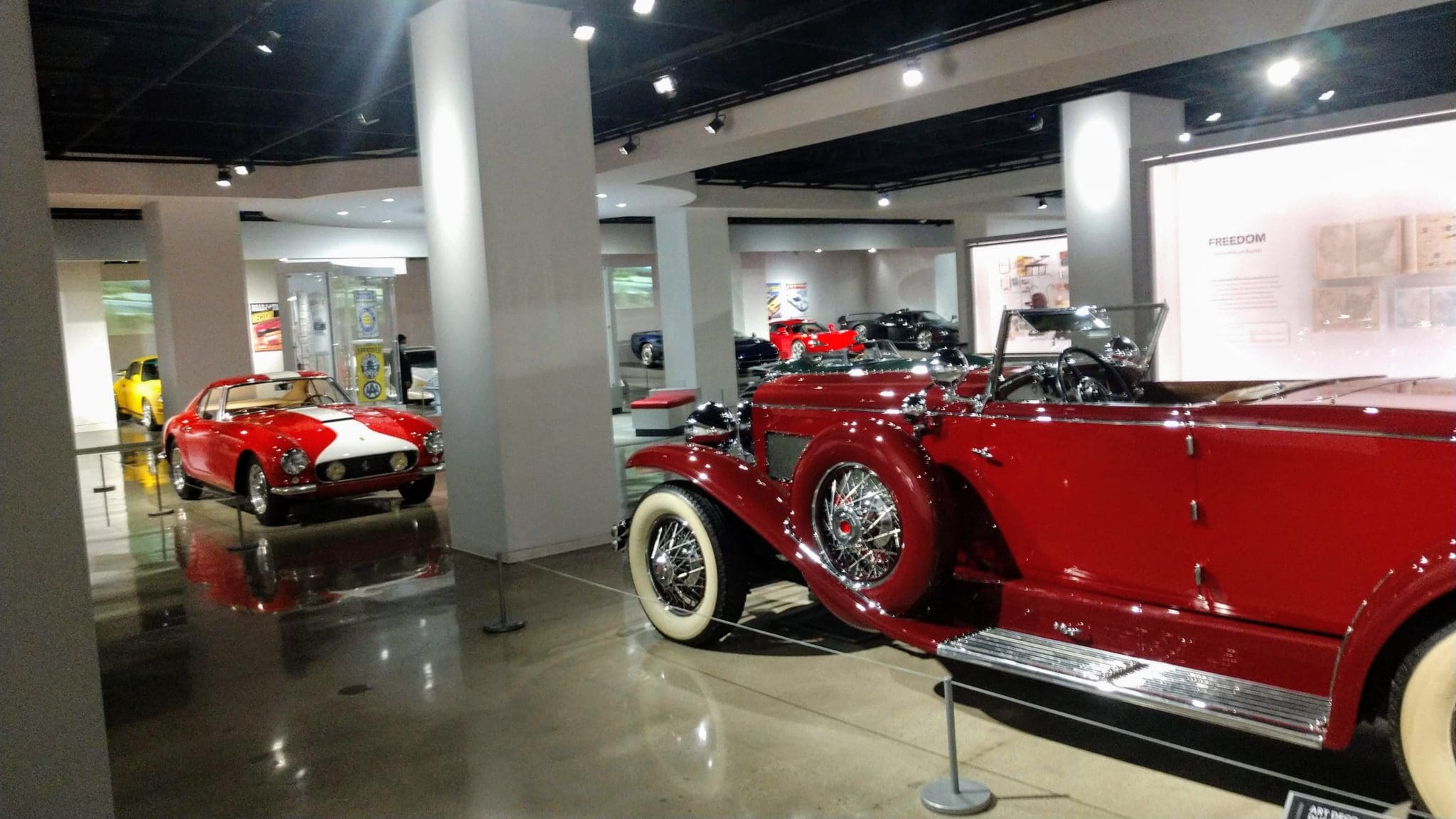 Better museums (and I use that designation intentionally) display fewer cars, making it possible to walk all the way around each one, to see inside, to appreciate the arrangement of controls and gauges, the line of the fender, the slope of the windshield, the styling of the door handle.
Better museums (and I use that designation intentionally) display fewer cars, making it possible to walk all the way around each one, to see inside, to appreciate the arrangement of controls and gauges, the line of the fender, the slope of the windshield, the styling of the door handle.
On today’s visit, my second time at the Petersen, I stepped off the elevator to begin my visit with a 1924 Mercedes Targa Florio. This is the oldest Mercedes I’ve ever seen, and it looked odd. Designed to serve either as a road car or a racer, the floorboard features a couple of oddities. One, according to a docent, enabled the passenger to dump gasoline, to lighten the car in a race. (The passenger envisioned was the driver’s mechanic; I’ve never had a passenger I would trust with such power.)
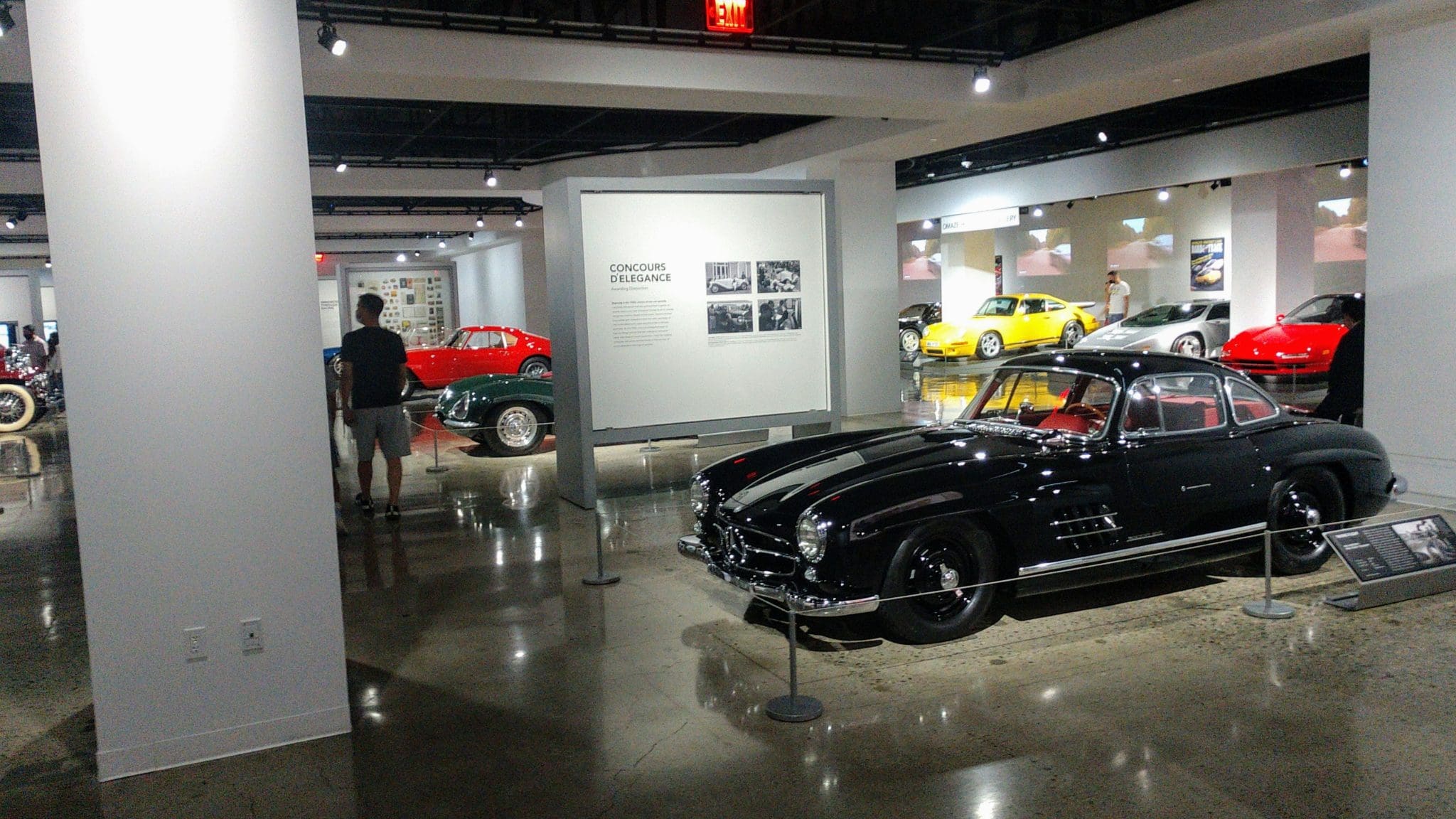 The Mercedes was an introduction to the theme of the current top-floor display, having to do with the relationship between racing and the more sedate everyday driving we mainly do. It includes “supercars,” an ad-speak term that used to mean style, grace, and power but now is coming to mean only pointless horsepower that appeals to immature boys of every age and a price tag that appeals only to those with more dollars than sense.
The Mercedes was an introduction to the theme of the current top-floor display, having to do with the relationship between racing and the more sedate everyday driving we mainly do. It includes “supercars,” an ad-speak term that used to mean style, grace, and power but now is coming to mean only pointless horsepower that appeals to immature boys of every age and a price tag that appeals only to those with more dollars than sense.
Personally, I fit only one of those categories.) The exhibition also includes other, less exotic but hardly more “normal” vehicles, from the 1913 Mercer Raceabout to the 1967 AC Shelby Cobra, the 1933 Deusenburg SJ convertible to the 1955 Jaguar XKSS, the very one that Steve McQueen used to irritate the neighbors with as he drove through LA’s canyons. (According to the knowledgeable docent keeping an eye on the floor, that car was the loudest one he had ever heard, when it was moved onto the floor for display.)
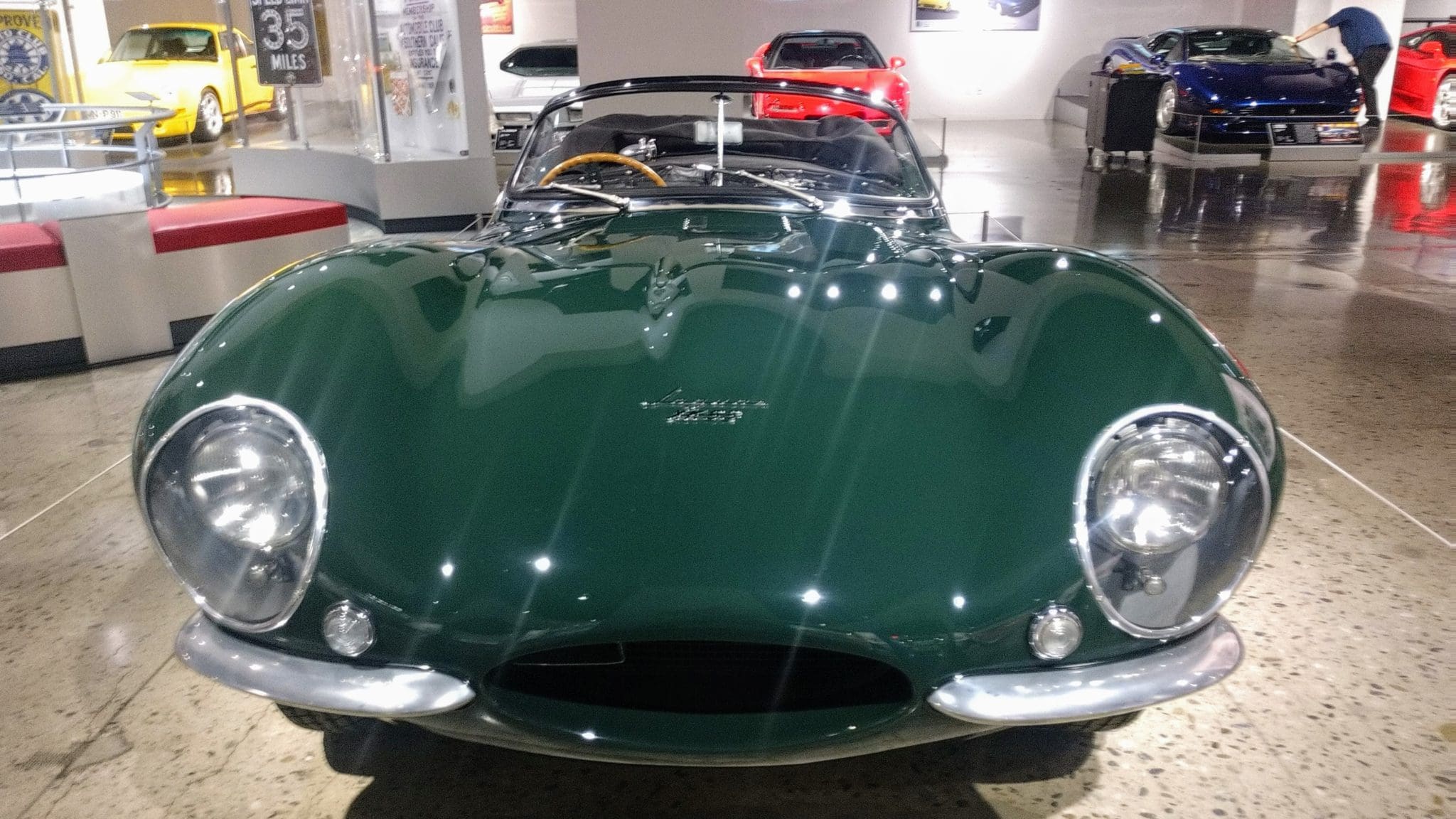 In a particularly interesting juxtaposition, a 1952 Ferrari Inter Barchetta Superleggero (super-light-weight) roadster sat facing a Mercedes-Benz 1955 SL (for SuperLeicht) gull-wing coupe, in the same jet-black skin. Two distinct cars, both beautiful, and both tremendously important, in different ways, to the designs of so much that came after.
In a particularly interesting juxtaposition, a 1952 Ferrari Inter Barchetta Superleggero (super-light-weight) roadster sat facing a Mercedes-Benz 1955 SL (for SuperLeicht) gull-wing coupe, in the same jet-black skin. Two distinct cars, both beautiful, and both tremendously important, in different ways, to the designs of so much that came after.
Being in Los Angeles, it’s natural that the Petersen should be well-known for a collection of movie and TV-related cars. They used to be on the top floor, and perhaps will be again after the current show; the signs showing their location up there haven’t been removed, though nobody seemed the least bit confused about it.
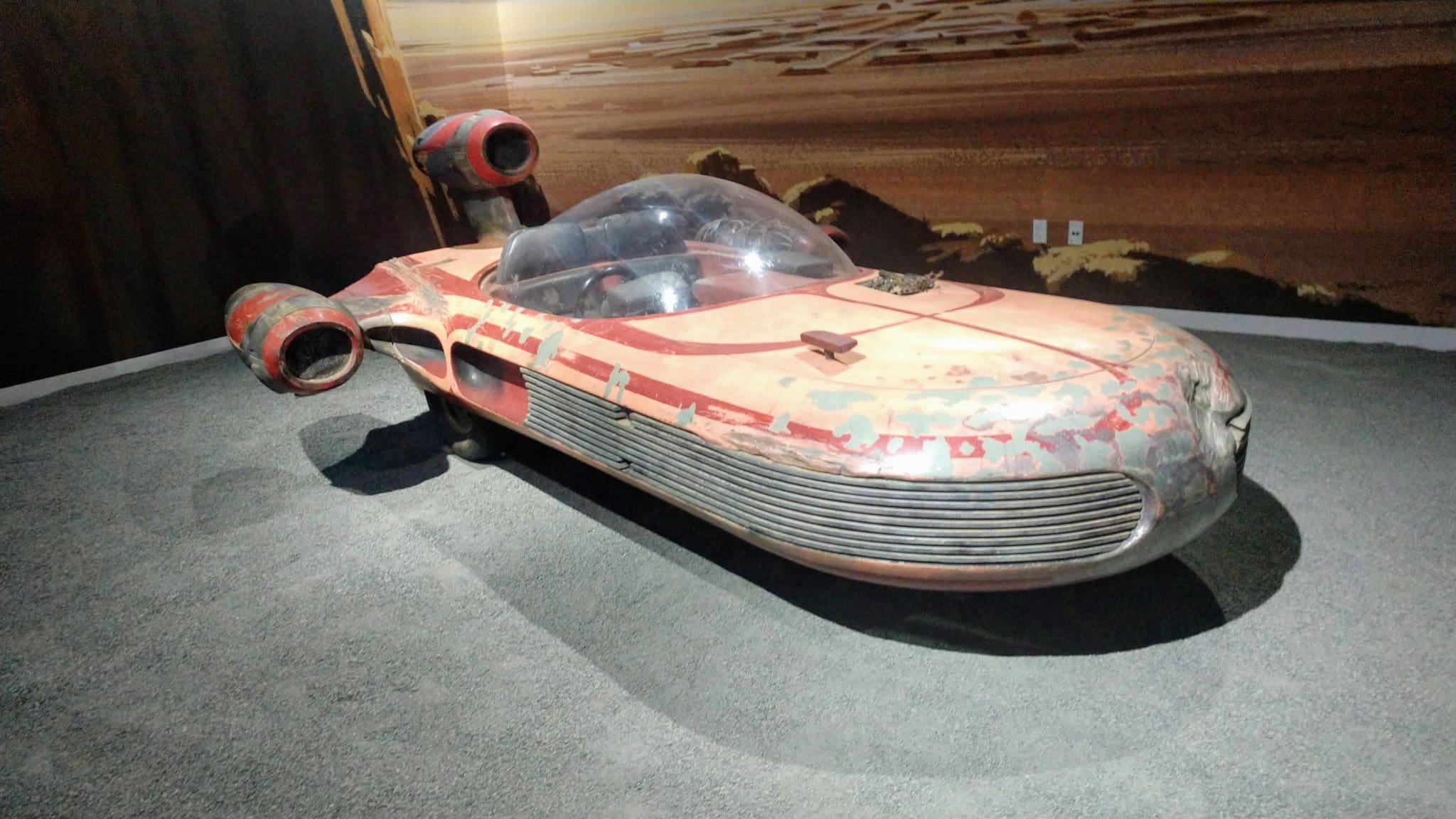 Those cars — the ones currently on display, at least — are currently on the first floor, in an exhibition focussed on cars used in fantasy movies. The kids will love it, even if they’re not familiar with the movies. (I certainly did.)
Those cars — the ones currently on display, at least — are currently on the first floor, in an exhibition focussed on cars used in fantasy movies. The kids will love it, even if they’re not familiar with the movies. (I certainly did.)
There are, of course, the required Batmobiles — three of ‘em, if I remember right; plus cars and car-like vehicles used in futuristic movies like Blade Runner and Minority Report. And there’s the holy-of-holies, Luke Skywalker’s ground speeder from Star Wars Episode IV: A New Hope. The one he left behind a long time ago in a galaxy far, far away.
The ground floor also contains an exhibition dedicated to the work of Pinin Farina, one of the great Italian automotive design studios. The centerpiece of that exhibit is the beautiful 1953 Nash-Healey convertible, though other beautiful designs, from Alfa Romeos and Ferraris to a coffee maker, were also featured. I admit I didn’t spend much time admiring the coffee maker, but I think I took way too many pictures of the Nash-Healey
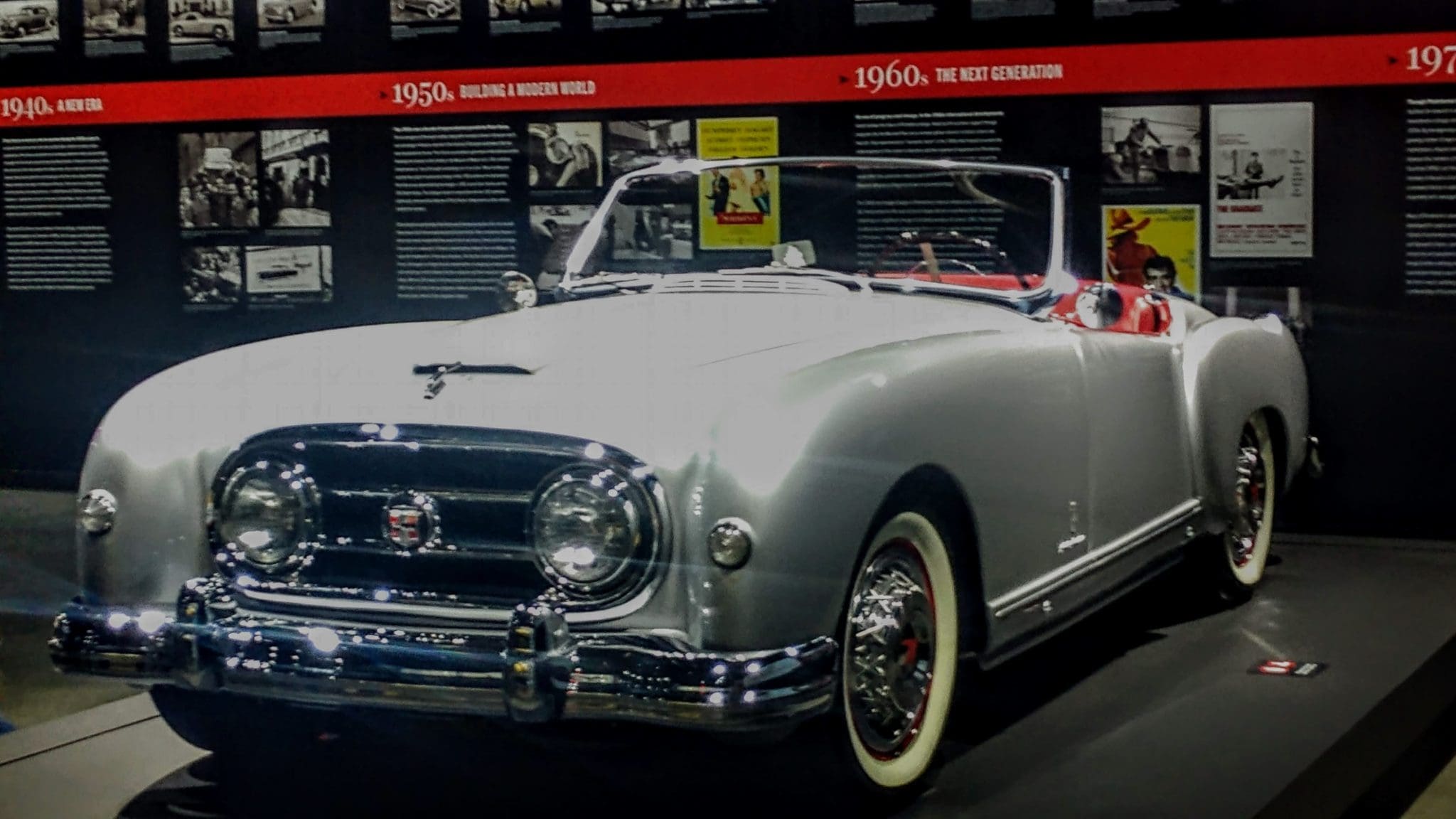 I made the mistake of believing online recommendations to expect to spend one-and-a-half to two hours at the Petersen. That didn’t leave me time to see the display on the second floor, dealing with engineering development and alternative fuels; a quick walk-through was all I could manage, but other than a new play area for kids and a few different exemplars of notable engineering developments, I had seen this exhibit in great detail the last time I was here. I would say that if you’re going to go to the Petersen, plan to spend around three hours there. It should be worth it.
I made the mistake of believing online recommendations to expect to spend one-and-a-half to two hours at the Petersen. That didn’t leave me time to see the display on the second floor, dealing with engineering development and alternative fuels; a quick walk-through was all I could manage, but other than a new play area for kids and a few different exemplars of notable engineering developments, I had seen this exhibit in great detail the last time I was here. I would say that if you’re going to go to the Petersen, plan to spend around three hours there. It should be worth it.
The museum has its own parking garage, with entrances on Fairfax Avenue and on 8th Street, at the back of the building. There’s also some metered parking in the area, but those are limited to two hours and, to be honest, most of the meters are so poorly maintained that you won’t be able to tell how much you’re spending.
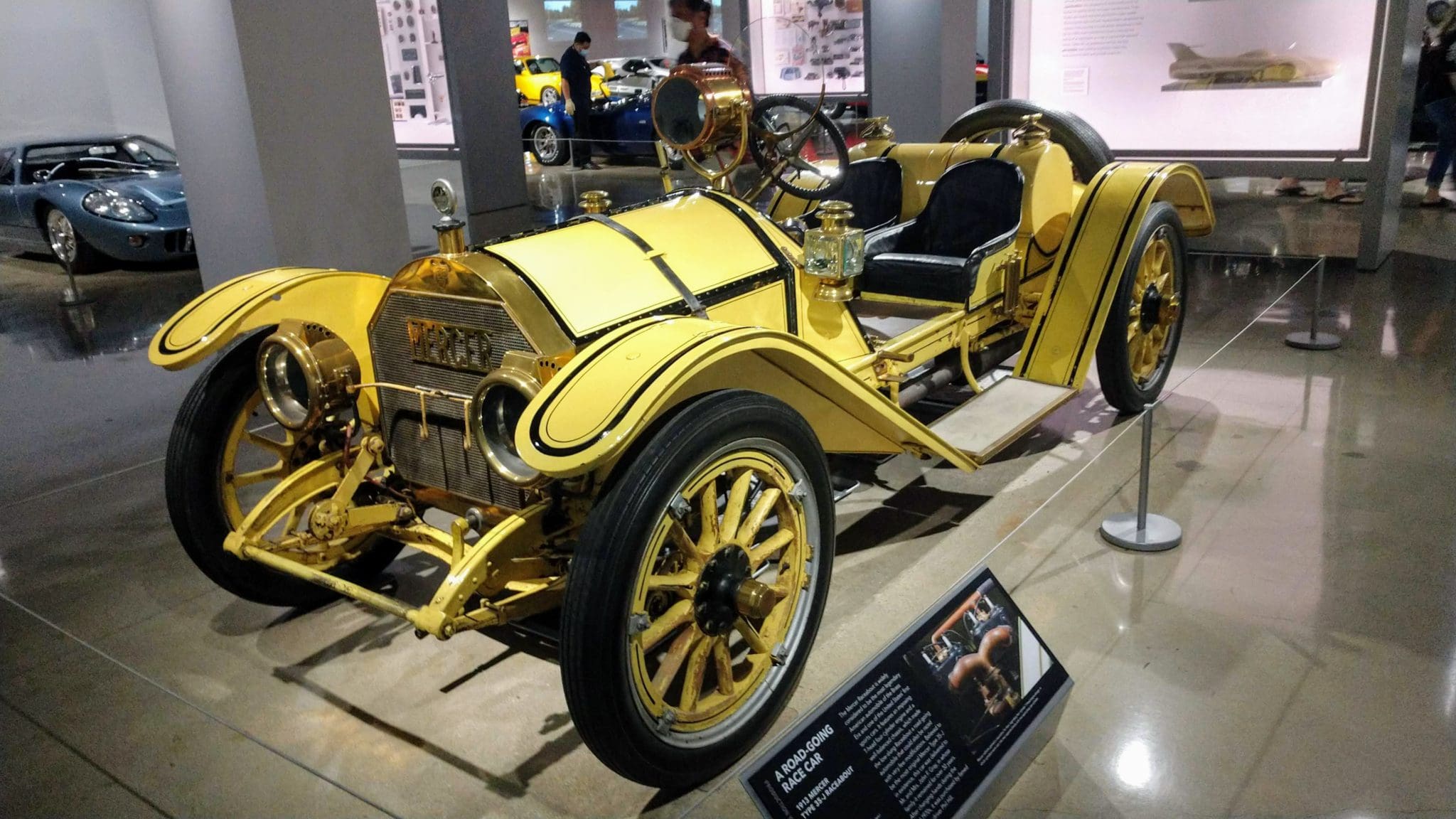
The Petersen Museum also offers access to its “vault,” the parts of its collection not presently on display in the museum proper. I haven’t seen it, but from descriptions and photographs of it, those cars are lined up bumper-to-bumper. But there are more than two hundred of them, so it’s a trade-off.
Photo credit Passepartout22
Automotive Museum Guide Contributor
The Rambler Ranch is the culmination of Terry Gale's ideas, style, and tastes from a broad and diverse range of sources,
The Museum of Bus Transportation (MBT) has merged with the AACA Museum to have a permanent exhibit on display.
Texas Fire Museum has over 60 antique fire vehicles on display to showcase a century of fire service in this nonprofit museum.
The San Antonio Fire Museum is, as many visitors say, one of San Antonio’s hidden gems.
automotive museum guide
Sign up to get updates about automotive museums right to your mailbox. Don't miss a thing. It's FREE.
Georgia is home to a few amazing car museums. The list below shows some of Georgia’s most popular car museums every automotive enthusiast must visit.
This list is not in order nor is this a complete list of all the car museums in Georgia. This is simply a list of 5 car museums worth visiting in Georgia. To see the complete list of car museums in Georgia click HERE.
How many of these car museums have you visited?
Plus, SAVOY AUTOMOBILE MUSEUM is a new car museum scheduled to open by the end of 2021 in Cartersville, GA. Savoy is a part of Georgia Museums Inc. and will be a world-class car museum.
Here’s a bonus car museum, unlike all the others. OLD CAR CITY USA is a junkyard full of over 100 vehicles and is known as a car photographer hot spot.
Check out the map below of all the automotive museums in North America.

Creator/Author
Sean Mathis is the Founder of the Miles Through Time Automotive Museum in Clarkesville, GA, and the creator of the Automotive Museum Guide.
.
The Rambler Ranch is the culmination of Terry Gale's ideas, style, and tastes from a broad and diverse range of sources,
The Museum of Bus Transportation (MBT) has merged with the AACA Museum to have a permanent exhibit on display.
Texas Fire Museum has over 60 antique fire vehicles on display to showcase a century of fire service in this nonprofit museum.
The San Antonio Fire Museum is, as many visitors say, one of San Antonio’s hidden gems.
automotive museum guide
Sign up to get updates about automotive museums right to your mailbox. Don't miss a thing. It's FREE.
Presented in conjunction with the Z Series Car Club of America’s Z Fest, celebrating the 25th anniversary of Z3 production in Greer, South Carolina.
BMW Z Cars: Freedom & Fun presents the complete history of BMW’s Z-series roadsters and coupes, from the innovative Z1 through the latest G29 Z4. With 20+ cars on display, you’ll see the complete evolution of the Z3, Z4, and Z8, including the high-performance M versions and a pair of rare Alpinas.
They’ve also included some rare competition machinery, too, including a never-raced and little-seen Z3 coupe, a Z4 GTLM, and TC Kline’s superlative Z4 Carbon Coupe. Get up close with these exotic machines, and check out the details that make BMW’s Z-cars special!
As a bonus, the BMW CCA Museum will be displaying its permanent collection in The Ultimate Driving Museum. Come say hello to Yale Rachlin’s 2002, Mike Ura’s 2002 tii LUX, a stunning 2800 CS owned by four CCA luminaries, and several other BMWs with fascinating histories!
This exhibit is on display through January 29, 2022 at the BMW CCA Foundation’s The Ultimate Driving Museum in Greer, South Carolina—right across Highway 101 from BMW Manufacturing, and just down the street from the BMW Performance Center.
Check out the past exhibit on display. The Genesis Collection
Scroll the picture gallery, although, the pictures do not do this exhibit justice. If you can, make sure you visit the BMW CCA Museum before it’s too late.
.
The Rambler Ranch is the culmination of Terry Gale's ideas, style, and tastes from a broad and diverse range of sources,
The Museum of Bus Transportation (MBT) has merged with the AACA Museum to have a permanent exhibit on display.
Texas Fire Museum has over 60 antique fire vehicles on display to showcase a century of fire service in this nonprofit museum.
The San Antonio Fire Museum is, as many visitors say, one of San Antonio’s hidden gems.
automotive museum guide
Sign up to get updates about automotive museums right to your mailbox. Don't miss a thing. It's FREE.
Michigan is home to some amazing car museums. The list below shows some of Michigan’s most popular car museums every automotive enthusiast must visit.
This list is not in order nor is this a complete list of all the car museums in Michigan. This is simply a list of 10 car museums worth visiting in Michigan. To see the complete list of car museums in Michigan click HERE.
How many of these car museums have you visited?
Here’s a bonus, SLOAN MUSEUM is at Sloan Museum’s Courtland Center Mall location, where visitors can enjoy Dinosaurs Unearthed, as well as over 30 historic vehicles, and Wisner’s Whizbang Emporium, where families can play together.
Check out the map below of all the automotive museum in North America.

Creator/Author
Sean Mathis is the Founder of the Miles Through Time Automotive Museum in Clarkesville, GA, and the creator of the Automotive Museum Guide.
.
The Rambler Ranch is the culmination of Terry Gale's ideas, style, and tastes from a broad and diverse range of sources,
The Museum of Bus Transportation (MBT) has merged with the AACA Museum to have a permanent exhibit on display.
Texas Fire Museum has over 60 antique fire vehicles on display to showcase a century of fire service in this nonprofit museum.
The San Antonio Fire Museum is, as many visitors say, one of San Antonio’s hidden gems.
automotive museum guide
Sign up to get updates about automotive museums right to your mailbox. Don't miss a thing. It's FREE.